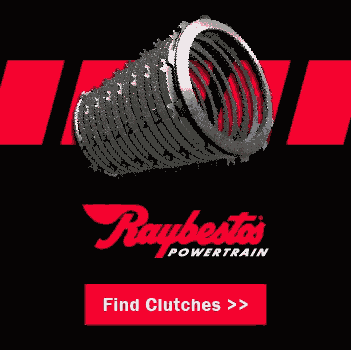A4CF1 Transmission parts, repair guidelines, problems, manuals
A4CF0
Transmission general data
| Number of gears | Transmission Type | Drive | Torque (Nm) | ATF (full capacity) L | ATF (change) L | ATF type |
|---|---|---|---|---|---|---|
| 4 | AT | FWD | 160 | 6 | 3 | SP-III |

The 4-speed modern automatic transmission A4CF1 produced in 2005 and its more powerful modification A4CF2 from Hyundai were designed for cars with the engine capacity up to 2 liters. Since 2006, these automatic transmissions can be installed on all FWD small cars of Hyundai (Accent, Solaris, Ceed, Getz...) and Kia (Spectra, Forte, Cerato, Soul...).
The first modification A4CF1 had a lot of problems, therefore an updated modification named A4CF2 was released in 2005. Minor changes in electrical parts and computer settings were introduced in 2007 in order to prolong the transmission lifespan that may be comparable with the resource of the whole car.
What are you looking for?
Overhaul Kit | Friction Kit | Friction | Steel Plate | Steel Kit | Band | Solenoid Kit | Solenoid EPC | Solenoid TCC | Pump | Shaft | Drum | Valve body | Torque converter | Hub | Piston | Piston Kit | Planetary Gear | Filter | Gasket | Bushing | Seal | Bearing | Pressure Plate | Stator | Differential | Retainer | Inhibitor Switch | Instruction manual | TOOLS & ACCESORIES | Sensor
Which cars run with this gearbox?
| Brand | Model | Year | Type | Engine |
|---|---|---|---|---|
| Hyundai | AVANTE | 06-16 | 4 SP FWD | L4 1.6L |
| Hyundai | AVANTE HD/MD | 06-12 | 4 SP FWD | L4 1.6L 2.0L |
| Hyundai | CRETA | 15-16 | 4 SP FWD | L4 1.4L |
| Hyundai | GETZ | 06-09 | 4 SP FWD | L4 1.4L |
| Hyundai | HB20 | 12-16 | 4 SP FWD | L4 1.6L |
| Hyundai | I10 | 13-16 | 4 SP FWD | L3 1.0L L4 1.2L |
| Hyundai | I20 | 08-14 | 4 SP FWD | L4 1.4L 1.6L |
| Hyundai | IX20 | 10-16 | 4 SP FWD | L4 1.6L |
| Hyundai | VERNA | 07-16 | 4 SP FWD | L4 1.4L 1.6L |
| KIA | CARENS | 09-12 | 4 SP FWD | L4 1.6L |
| KIA | CEE'D | 07-11 | 4 SP FWD | L4 1.6L 2.0L |
| KIA | CERATO | 05-10 | 4 SP FWD | L4 1.6L 2.0L |
| KIA | FORTE | 06-16 | 4 SP FWD | L4 1.6L |
| KIA | MORNING | 14-16 | 4 SP FWD | L4 1.2L |
| KIA | QIANLIMA | 11-12 | 4 SP FWD | L4 1.4L 1.6L |
| KIA | RIO | 11-16 | 4 SP FWD | L4 1.4L 1.6L |
| KIA | SOUL | 08-16 | 4 SP FWD | L4 1.6L |
| KIA | VENGA | 09-16 | 4 SP FWD | L4 1.6L |
| Zhonghua | H330 | 13-16 | 4 SP FWD | L4 1.5L |
Technical issues and repair guidelines
Typical problems during the first years of the transmission operation are related to change of ATF and filter replacement. It is recommended to replace all friction components together with the kit of gaskets and seals during the transmission rebuilding.
Common problems in A4CF2-\1:
The list of the most popular repair procedures for this transmission includes the valve body reassembly and replacement of solenoids. The most vulnerable failure-prone are VFS (EPC) solenoids and PWM solenoids. The problem is related to contaminated and hot (because of the torque converter) transmission fluid and resource wear-out. In many cases problems with electrical parts are caused by faulty wiring of solenoids.
Some problems may occur in the pump as a result of a long-time operation with the leaking seal, damaged bushing (applicable to A5HF1) and shaft vibrations.Specialists assume, that high temperatures and forced torque converter lock-up lead to rapid oil contamination and this suspended fluid clogs and wears out channels in the valve body and solenoids, leading to the oil pressure shortage in packages and early burning of friction components. A long-time operation with the pressure shortage and vibrating clutch lock-up leads to problems with the pump and some other unpredictable issues.
Instruction manuals and useful links Suggest your link
| Link type | Source | Description |
|---|---|---|
| www.at-manuals.com | Scheme A4CF1 A4CF2 | |
| www.at-manuals.com | Valve body valves A4CF1 A4CF2 | |
| www | www.at-manuals.com | Solenoid application chart A4CF1 A4CF2 |
| www | www.at-manuals.com | Hydraulic pressure table A4CF1 A4CF2 |
| www | www.at-manuals.com | Clutch application A4CF1 A4CF2 |
| Sonnax | Valve Body Layout A4CF1 | |
| drive.google.com | Repair manual A4CF2 | |
| drive.google.com | KIA general information A4CF2 |




